Secretly re-opening this blog after close to fifteen years.
What can I say about TRON: Legacy? I said this the only other time I've seen the movie, but the script feels "like someone took a lot of work structuring your classic hero's journey and building up the protagonists and antagonists on interesting paths, made sure all the beats made sense, and then handed the script to a tenth grader." I couldn't have said it better myself.
A note on the CG. The human-simulation technology was not there, which is jarring because literally every other frame of CG holds up today, I think. But the choice to de-age Jeff Bridges for CLU/young Flynn remains the glaringest element of the mixed-bag movie, and I feel like it could have been saved if they'd chosen to lean into their limitations by making CLU's digialness a feature, not a bug. Either make all programs a little smooth-faced (to be fair I can think of several reasons not to do this to every character except the Flynn men), or make CLU's exceptional age/background/uniqueness as a program.
I also feel weird about them inventing and eradicating an entire species of self-aware spontaneous "programs," just so that Quorra could have a convoluted backstory that doesn't seem too important to the main conflict. (Easiest way to tell that's true: CLU doesn't give a shit about Quorra, doesn't see the value in Quorra or her life-disk-thingy, etc. Quorra is just a sidekick with too much character design.)
Interesting expansion of the world, and interesting visual reimagining of the world. I miss the 80s styles when I watch it, but I also don't at all hate what they've done to the universe to update it. The same phenomenon, I suppose, as seeing Star Trek from the 60s, 80s, 00s, and 20s each look radically different without harming the plausibility of the universe. It's exciting to see a sort of aesthetic flexibility in franchises, I think.
03 January 2025
15 July 2011
Incident at Loch Ness
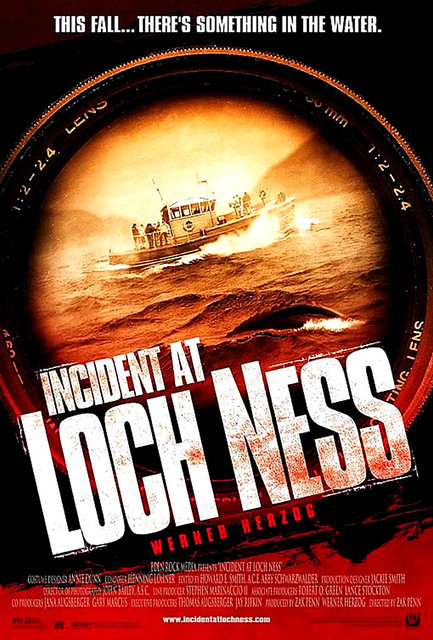
The idea of a mockumentary about a film crew trying to capture the crazies who believe in the Loch Ness Monster is a good one, but taking it to its mockumentary logical-extreme and casting Werner Herzog as the documentarian in question elevates this from a good idea to a great one. Standing on the shoulders of Herzog's mystique and living-legend status and skewering himself as a baldly (if incompetently) narcissistic "Hollywood producer" is pretty brilliant. He exploits everyone: he willfully sabotages and undermines the legitimacy of Herzog's art, repeatedly risks the lives of his entire crew, and even in life-and-death situations has no capacity for honest confession or anything but a self-serving, paranoid and cynical nature. But instead of making that character a villainous one-dimensional scoundrel, Penn turns it into a buffoon, a moron incapable of distinguishing between real and fake (the film repeatedly mentions the difference between truth and fact).
Sidenote: By coincidence, I first saw this film a week before I saw Grizzly Man in theaters. I therefore had a very, very hard time taking the story of Timothy Treadway at all seriously, and in that light much of Herzog's self-aware-but-un-self-conscious narrative style and editorial choices struck me as hammy, melodramatic, even a little vaudevillian. But back then I hadn't seen many Herzog films, so I just assumed his thing was to skirt the line between fabrication and fact, looking for realer truths than a straight documentary might uncover. (Which, by the way, I was completely fine with. Not to get pedantic, but facts reveal nothing, and fiction often reveals many truths.) Now I know better, and while Incident is still a beautiful turn-it-on-its-head story of real and fake, I know that Herzog himself is generally far more intensely earnest than the tone of this film. Which really, is why it works in the first place.
09 July 2011
Taxi Driver
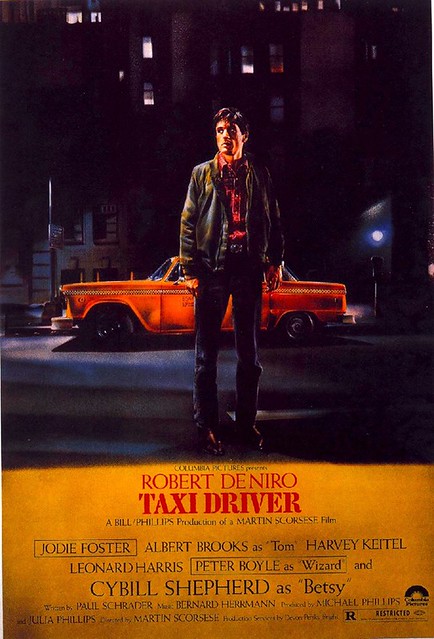
Again, another film I wish I'd had more time when I saw it to talk about, because there's so much to say. I guess there's nothing I might say about Taxi Driver that six million college kids haven't already said before, but still.
This is a film I have only seen a handful of times, actually. All the major plot-points and sequences stuck with me pretty well, but I'd forgotten the permeating sense of melancholy the film has. I remember it makes you a little uneasy, and you never quite know if you should like/side with Travis Bickle or loathe/suspect him, but I don't remember feeling this sorry for him last time I watched it. More than anything, Taxi Driver strikes me as one of the saddest films I've seen in a long time -- and it actually reminds me even more of Observe and Report than I expected it to -- a film that, when I saw it, I tried to convince people wasn't a farcical comedy, but a disturbing black-comedy/character-driven absurdist tragedy in the vein of Big Fan or Taxi Driver).
Not scary (I mean, it has its moments). Not thrilling (again, same). Not funny (I could go on). This film is sad. Bickle was so broken from before this starts, there was nowhere to go but down, and we have no choice but to watch him lose it.
Dead Man
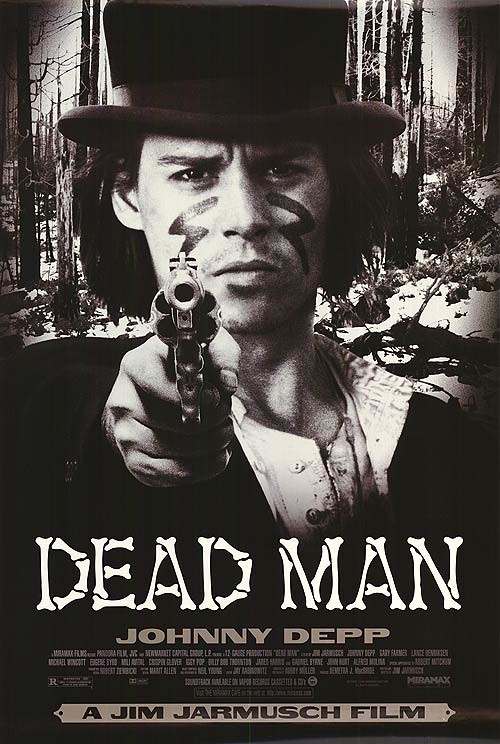
It's tragic that life got so busy I couldn't blog about two amazing and blog-worthy films I saw recently. So it will have to suffice to say I watched them, a couple of days ago.
Dead Man is almost certainly my favorite Jarmusch film, and one of my favorite films in general. It is everything about a western upside-down. It is the transcendent poetry of Blake turned pensive and existential. It is one of the best examples of true Absurdism in film that I can think of. And it's dark and poetic and funny as hell.
27 June 2011
Godfather, Part II

Of course I want to talk about this one for hours, but I can't and won't. I've only seen Par II once or twice ever, and the most recent was more than five years ago, so I got to come at it with reasonably fresh eyes. And I'm sorry, hardcore fans, but The Godfather (Part I) is an undeniably better film. It's a matter of bias (though what do you expect?), but the first film has a sharp focus, a single journey for an entire family, a sense of larger-than-life tragedy as many lose their lives and others lose their souls to grander causes.
Part II seems in every way the best-case scenario "smart sequel." It expands the world by showing us what happens next (and what came before), and it deepens the existing themes and crises as it goes. But apart from some really strong drama and really smart filmmaking, I'm not sure it says a whole lot more about the themes or crises than the first film said. Kay's crisis (which really represents Michael's sacrifice of his humanity and compassion) is more forefront, and the drama of what she goes through is darker throughout, but it never felt surprising or revealing in any way beyond the expected. Michael's relationships with Tom Hagen and Fredo are similar: they expand in scope and develop as plot points, but they are built from the same basic building blocks that shaped the relationships of the first movie. Tom is more at ease with his position, though he shows several times an emotional sensitivity to being shut out or misused; Fredo is less at ease with his, having now been more formally overstepped by his little brother, but he is basically the same well-meaning, weak-willed, marginally incompetent tragic character he was in the first story. There he never betrays the family directly, but he seems to insult them by betraying their philosophies and way of life (when he gets in with Moe Green); here he betrays them more directly (in scenes we are tragically never witness to, but then again it's not Fredo's story) but only because his wounded pride and desperate need for respect (mostly self-respect, but also the respect of his brothers and peers) are manipulated. It all works, and it tells a really good story that deserves the kind of respect it got, but it's a more fragmented continuation of Part I.
Actually, to put that another way and give it a little more credit: it's the kind of rich, robust, true-to-the-original-themes storytelling that we see more now, in serialized television than we saw then, in feature films. I'm sure it was no coincidence that this film doesn't bear any title other than the original's, it is merely Part II, not Part II: Michael's Mafioso Adventures or whatever. This is simply a continuation. It could be viewed best (and perhaps only) as the same story, not a new one.
One last thought I'll keep brief: I thought the Vito backstory was beautiful, and well-performed, and pretty well-written, but it always felt a little like Vito telling his own story. He was always just a little too noble, a little too beyond reproach in his actions. I'm not sure he shows a single weakness in any scene, and he never makes a misstep or mistake, never loses a thing in his journey. It was nice to see the rise of the man (and Empire), but it almost seemed a little too Yin and Yang, with Michael's consistently tragic (and surprisingly messy) story.
I want to go on, but other matters demand my attention tonight.
Tags:
francis ford coppola,
g
26 June 2011
Buck *
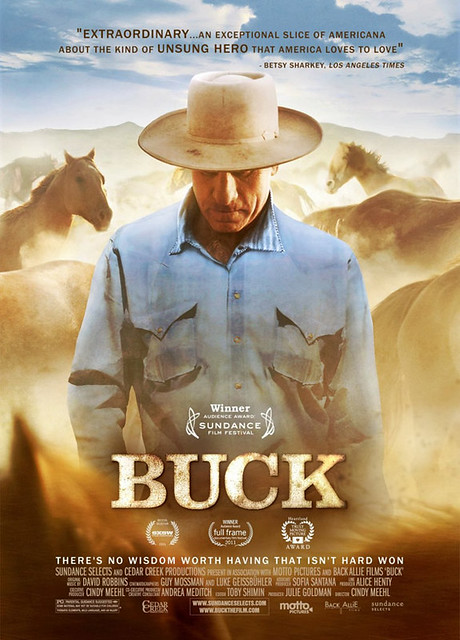
(Time barely allows me the luxury of movie watching, let alone long writing blathery blog entries about what I watched. That may be for the better. It means the thoughts will get a lot briefer. Case in point...)
Buck is a pretty ideal character study documentary, in that it takes a character with a really concise and distinct hook, is clear about who he is and what he does and where he's come from -- and illustrates an insider's world with total clarity, such that a total outsider like myself is brought in. It's light on dramatic arc or sense of "journey," but it captures the character in a complete-feeling way, and it even allows us to see him fail (he was unable to tame the oxygen-deprived "predator" horse Cal), though I wouldn't have minded seeing more reaction to that failure -- nothing shows character like how one deals with a crisis, and outside of life-and-death scenarios, few crises are as big as the inability to do the one thing you're best at.
Mostly, though, Buck feels like it's a story about emotions, and how we channel what we're given or who we are into those around us. It's a story about paying it forward, and being aware of that cycle. Buck's dad abused him terribly, but Buck transforms the feeling of being a victim into compassion for another creature. Buck's clients are told repeatedly that how they treat their horses mirrors who they are as people. I've held that theory about household pets for years as well -- that the "personalities" of your cats and dogs are echoes back to you of who you are. Whatever aspect of you you show them that resonates with whoever they already are, that is what amplifies and reflects back from them. So much more so with more intelligent creatures like horses.
Seen at Cinema 21.
Tags:
b,
cindy meehl
21 June 2011
Female
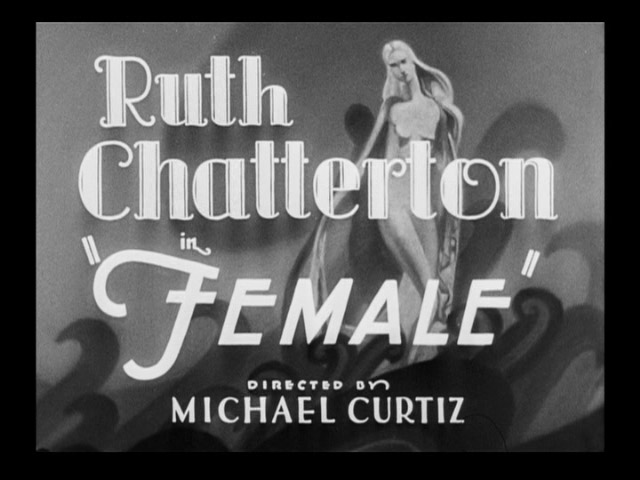
Holy shit.
Look, I know a movie is a product of its times and all, but this seems like the kind of thing you show to a bunch of Reed-graduate women's studies majors to see if you can give one an embolism. The plot basically boils down to: hard-nosed extremely successful career-minded lady is CEO of an automobile company and the only one with the cajones to keep the company afloat through hard times. She blatantly abuses her power as head of the company to invite salesmen and execs and engineers over to her palatial home for dinner and "private business meetings," in order to aggressively seduce them, only to snub them brutally (and in some cases, transfer them to Montreal for not being quick enough to get the signal that they'd been blatantly used by their boss) the next morning at the office.
Before you start thinking this is a pretty awesome role-reversal with a sexually empowered and voraciously predatory woman who knows what she wants and takes it, hear out the rest of the story. All she's looking for is a man who can love her for herself, and when she finds one she not only leaps into his arms, literally transforming her entire personality three times in short order to be what he wants, but she makes repeated attempts to quit her successful job to be his wife. In fact, the story wraps up (very quickly, in about an hour actually) with her having tracked down Mr. Dreamboat Industrial Engineer and promising that she'll never set foot inside the automobile company again; she wants him to run her business now because she's "no good at it," and she's adamant about staying home and raising the nine children she promises to bear him. This is presented unambiguously as a bow-on-the-package ending to the romance movie.
Woman is dominating and kind of a bitch, only successful at the job because she pretends to be something she's not; woman finds the right man for her; woman gives up the powerful, lucrative job (to the man) and declares herself a homemaker, lickety-split. All she wanted was to be a docile wife. She finally got what she wanted. Happy ending! Look, I'm not touching that. I'll just leave it as it lay.
I will say, though, that though there was nothing outright bad about the direction or filmmaking, the performances were all a little hokey and forced in a way that -- if I'm really honest with myself -- makes me re-evaluate some of the characters and performances in Casablanca. But mostly, Female had none of the inspired or inspirational dynamic-energy, shadows-and-light (literally in the camera work; figuratively in the elements the story brings together) that makes Casablanca such magical cinema. This was a weirdly misogynistic treatise posing only barely as a light-hearted not-quite-screwball romantic comedy. The truth is, I think this film might offend more people than Lars von Trier or Gaspar Noé films. It's a weird one.
Tags:
f,
michael curtiz
20 June 2011
Dick Tracy

Time got away from me so I don't have as much to say about this as I might like to. The world-building and unreal comic-like artificiality is beautiful. The characters, especially the villains, are so entertainingly strange and so like the Dick Tracy comic strip that it's almost distracting. (To borrow a thought from Ebert's four-star review of the film, this is a world where everyone's personality flaws are written plainly on their unusual faces.) My friend says he vaguely recalls Beatty having to really convince Pacino to take the part, and while that may be true, so much of the character of "Big Boy" Caprice reminds me of Richard III and specifically, Pacino's own pet-project documentary Looking For Richard, that I can't help but wonder if the hunchbacked body-suit and the weird desperate-for-love vulnerability and misunderstood nature of the villain wasn't a contribution of Pacino's own, or at least teased out and exaggerated to suit his proclivities toward that Shakespearean character. On the other hand, much of the sexless earnestness of Dick Tracy himself reminded me almost too much of Beatty in Bonnie & Clyde, and made me wonder what the significance of such a flipside-of-the-same-coin parallel might mean.
Even all these years later, it's pretty much impossible not to see this film as living in the shadow of Tim Burton's first Batman (it came out the summer after; it uses a similar-but-less-hooky Danny Elfman score).
This isn't a flawless film -- in fact it's pretty sloppy in a lot of ways -- but what works about it really works. The characters are so flat and weirdly arbitrary that it can't be a mistake (someone find me a reason why Breathless Mahoney is so madly in love with Tracy?). It's a strange and flashy passion project that maybe wanted to be an early franchise builder, and while I keep reading rumors that Warren Beatty still intends to make a sequel (and if he does I'll go see it, no question), I'm kind of glad this didn't become a franchise after all. The thoughtful(-seeming) cardboardness of it all is amusing and entertaining once. I don't think it could have sustained a series. This story didn't have any room to grow. (Especially with "The Kid," who was just a hair shy of irritating, and any more with him -- as "Dick Tracy, Jr" and mysteriously as a certified police detective [??] -- would have proven absolutely unbearable.)
Tags:
d,
warren beatty
15 June 2011
Star Wars (Episode IV: A New Hope)

For as long as I've been alive, in every format of recorded video I've ever had access to, this has been my go-to movie. I know it so well I can fall asleep to it, sometimes before the droids get to Tattooine (~0:08:50), and if not then, then almost always before we meet Luke Skywalker (~0:16:30). It's also been my go-to for discussing story structure, as it hits all the right beats clearly and concisely, and is one of the most written-about screenplays in the history of cinema. (It's also my go-to cautionary example, how the constraints George Lucas had to face brought out the kind of ingenious problem-solving that made this film everything it is; versus the obstruction-free environment of the prequel trilogies [and even as early as Return of the Jedi] which led to a squandering of talent and resources and hard-won goodwill in an uninspired sloppy cash-grab.)
But it's that second thing that made me sit through the movie tonight. Like Magnolia and Dr. Strangelove before it, I went through and did a beat analysis breakdown of the whole story, noting even roughly when each scene-cut took place. Just to get my head back into thinking about big-picture stuff so I can give a good hard push on my script this weekend. That's the only reason I could tell you how many minutes in certain scenes happen. Act Two begins after Luke tells Ben, "There's nothing for me here. I want to go with you to Alderaan and learn the ways of the Force." The next scene (~0:42:45) has Ben and the gang standing on a cliff face, describing the first gauntlet they must beat: Mos Eisley Spaceport. ("You will never find a more wretched hive of scum and villainy," after all.)
The Midpoint (or call it Act Three, if you prefer thinking of a film as four equal-length acts; screw Syd Field, man) comes when their mission changes, from waiting for Ben to deactivate the tractor beam so they can all get away (their first mission of delivering R2-D2 to Alderaan having already been rendered null when their destination evaporated) into trying to rescue the captured princess from the black knight deep inside the well-protected castle (~1:08:18). The turn into Act Four (or Act Three, you Fieldians) is even easier to pinpoint: after having won a minor dogfight and escaped the castle/Death-Star, they deliver R2's plans (and the princess) to the Rebel Fortress (which is where they were headed all along, before the battle over Tattooine that sets everything in motion. From there they plan the attack (~1:41:00) to bring the whole thing down, and the majority of the final act is the big Death Star Trench sequence.
There's nothing I can't say about this film that hasn't been written before, probably. But I could say enough to fill ten blogs. I've seen this movie too many times. I admit it. I'm not a fanboy, exactly, but I'm not exactly not one either, if I'm being honest. Anyway, I grew up on it, with the toys, the t-shirts, the Pizza Hut drinking glasses, the bedsheets and bedroom curtains. The truth is, yesterday I was wearing some weirdo vintage Star Wars t-shirt my parents bought me for Christmas. So whatever. Anyway I'm mostly excited by it at this point as an exercise in combining and "modernizing" (if you will) Joseph Campbell myths and universal story elements. Even the ways it diverges from the screenplay formula are perfect examples of how to do so. And returning to it is often, at this point, a way of meditating on the relationships between scenes and sequences, sequences and acts, acts and story.
That's what I did. That's what I'll keep doing. The truth is, I've seen it too many times to look at it and just see another movie. This is a thing in my blood, a story embedded in my DNA when I was still learning how to view movies and stories and heroes. I can tear it apart and dismantle it and I can see all the parts and how they work and why, and I can marvel that they do, and occasionally I'll see through the rose-colored lenses and suddenly catch on a flaw (especially when fine-toothing like tonight) but throughout it all, there's something more than sum-of-the-parts in this bastard, and it's both magical and comfortable. It's childhood adventure, escapist fantasy, and clockwork perfection. No amount of looking under the hood is going to undo that. Seems like that's about as good a testament to its power as anything I can think of.
13 June 2011
The Tree of Life *
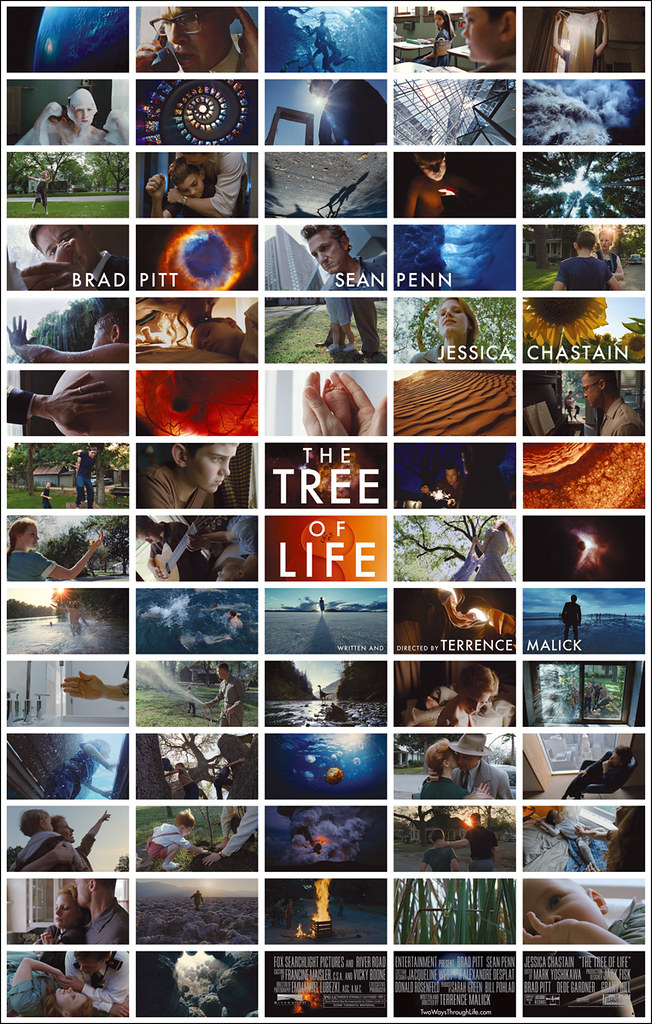
I don't have a lot to say about this one. Malick isn't a guy whose films you watch once and walk out with concrete, fully-formed opinions readymade for a blathering first-response movie blog. They have to sit with you a while and you have to give them some space to breathe. It sounds all lofty and hoity-toity, but I tried to give Jen a sense of what she was getting into (having not seen a Terrence Malick film before), and I said they were something like cinematic transcendental poetry.
It was beautiful and evocative and forced patience and open-mindedness while watching. The complicated emotions were never lost on me -- and I found a surprising amount of my own childhood echoed in the story of Jack and his father -- but some of the nitty-gritty plot details escaped me. (SPOILERS) For one, I was unclear for a while which son Sean Penn was portraying the adult-version of (he was Jack; by the end it felt obvious) and which son died (the musician boy, whose name I'm not sure they said). And mostly I had trouble linking the story of Adult Jack, in his world of glass of steel, to the idyllic/anti-idyllic past of Young Jack -- specifically, I couldn't find any specific impetus for him to be having such a rough time of it, and thinking back to his dead 19 year old brother (who we only meet as a child, incidentally; implying his death was not Jack's fault or perceived as such). Jen and I gathered it was an anniversary, but still. Adult Jack could barely keep his shit together, and the strength of his emotions felt disproportionate to the time and distance that separated him from the events. But this isn't a movie about its plot, and I didn't actually find those questions very pressing or important to the story. This is about the feelings, and the relationships, and the world, and the abstract impressions there aren't words for that come from the long sequences of nature and grace colliding.
The beautiful montage of images of the universe forming -- nebulas, planets, asteroids, early life, dinosaurs -- may have no literal use in this story, but it wouldn't have been The Tree of Life without it. But whether or not Adult Jack has a reason to suddenly miss his brother so much, that's not really the kind of thing that trips up the watching of this. I only linger on it here because, what else can I say? The rest of it needs a lot more time to digest.
Seen at the Regal Fox Tower.
10 June 2011
Super 8*

I saw the teaser once, then I went into ostrich-mode on this one. J.J. Abrams has a good track record so far (even Cloverfield is kind of a gem in that over-done genre), and teaming up with Spielberg for an homage/return to '80s-Spielberg -- that was enough for me. It already had my money. The less I knew about it the better.
Basically, it doesn't disappoint. It's got some DNA from E.T. and Close Encounters, and a lot of The Goonies, and although if you stop and think about it I'm not sure the story makes very much sense, it smartly sticks to the kids, and their story makes sense. It's fun, it's emotionally rewarding, it's smart, it's exciting, and it's legitimately scary. It's a little hamfisted more than once, but it's an 80s movie -- it really is more of a "return" than an "homage," because almost never does it tip its hat or modernize sensibilities; it feels like someone uncovered a film from about 1985 that has impossibly good effects for the time (and passingly good for now, though a little heavy on the CG) -- so hamfisted goes with the territory, and anyway the not-quite-subtle moments at least feel earned. Overall I enjoyed the hell out of this.
My biggest criticism of Abrams films is that he doesn't have the eye for iconic images and design that Spielberg has. I'm thinking of the Abrams-produced Cloverfield (which I have read Super 8 is supposedly not a prequel to, but I remain skeptical and unconvinced) and Star Trek, mostly, and now this. Compare those to any Spielberg film -- then or now, but especially then. Spielberg embeds his films with characters, costumes, ships, framing of shots that stick with you decades later. The look of E.T., the red hoodie, the fly-past-the-moon, the dinosaur in the rearview, virtually every frame of Raiders of the Lost Ark (the perfect storm of Lucas and Spielberg). Abrams doesn't really have those moments. [SPOILERISH] His characters are great -- nuanced takes on the archetypes of their genre -- and his stories move along at just the right pace, and are full of exciting, brilliant scenes, but his sense of iconic imagery feels lacking. The alien in Cloverfield, Big Red from Star Trek, and the monster here, all vaguely Lovecraftian tentacle-things, but almost the opposite of iconic or memorable. Messy, alien things. In a sense it's neat, and definitely consistent, but it's also a tiny bit disappointing. It lacks the "cinematicness" of Spielberg's design without adding any level of "realism" or "verisimilitude" in its place. And sometimes it comes off as functional without formal beauty. The same is true with his ship designs and character looks, I think. Nothing stands out, begs to be remembered. Very few shots leap off the screen and scream "this could be your poster, but even if it's not, you'll remember me forever."
I only even think of this because of the odd consistency in the alien design (also reminiscent of The Mist and Monsters... clearly a trend), and because this is "Abrams doing Spielberg," which begs that sort of comparison. Still, a lack of iconicness (iconicism?) doesn't detract from the film's enjoyment. And this one was fun.
If you're reading this and you haven't seen it yet, stay for the credits. It's not a spoiler/twist kind of thing. It's just fun.
Seen at Regal Lloyd Center Cinema.
Tags:
j.j. abrams,
s,
steven spielberg
09 June 2011
十三人の刺客 (13 Assassins) *
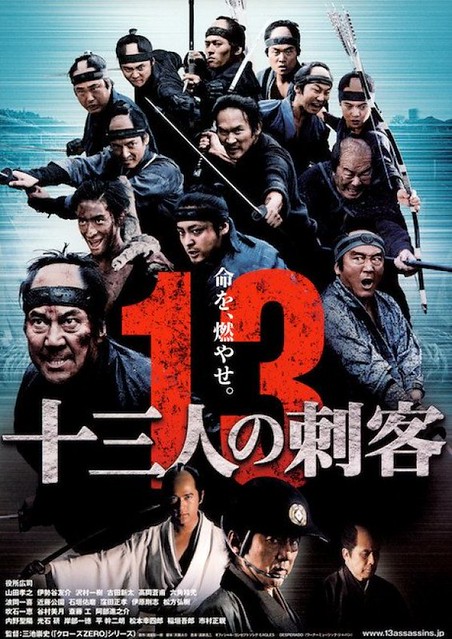
Jen (the girlfriend) put it best when halfway through the movie she leaned over and whispered, "Now these are real Tough Guys." The Japanese are not, in modern times, thought of as a particularly tough people, but boy, what a history. They weren't fooling around. The stakes don't get higher than a hero (or band of heroes) who have willingly committed to giving their lives to a cause, to a leader. In movies the hero says that kind of thing all the time -- I would die for you, for that belief, for her, for my country -- but it's all talk. The hero is in no real danger of dying, and he might as well know that when he makes these oaths, because we know it when he makes them. Sure, it sounds so cool, but the men and women who swear by it don't mean it -- or if they do, they don't mean it with the kind of brutal "I will cut my guts out with my own knife on a matter of principle" way the samurai meant it in Feudal Japan.
It seems to me like Miike is making a real case here for just what that kind of oath means. He's exploring the reality and the gravity of swearing an allegiance so powerful you would die for your boss unflinchingly. He pits two old comrades against each other, and though they remain bitter adversaries to the very end, their rivalry isn't borne out of some ethical or philosophical difference -- in fact both men repeatedly imply that, but for the twists of fate that make up their lives, they could easily have ended up on the other's side in all this. The chase- and battle-to-the-death that Shinzaemon and Hanbei see to the end (and arguably beyond) is borne out of literalizing the samurai's oath, notoriously in a time of peace. A sadistic evil lord (Miike also takes the usually-all-talk ivory-tower cruelty that goes along with that notion to new extremes) is Hanbei's master. Therefore, it doesn't even matter that Hanbei opposes him philosophically, is disgusted by him personally and morally, or that he literally fears for the future of Japan if his lord succeeds; he will fight to his dying breath savagely and furiously to protect him and to help him succeed. That's what a good samurai does.
13 Assassins doesn't flinch or hold back in the morality of this -- or the mortality. It's Takashi Miike, after all. And actually, if anything, apart from some early-on imagery that was hard to take, I found most of the action and drama remarkably subdued, character- and plot-driven and never shock for its own sake, or envelope-pushing because he can. There was very little zany or madcap in the story (though the amusing Kikuchiyo-homaging 13th assassin certainly has elements, as does the villain himself). It was more about the idea of honor and nobility and sacrifice than about visceral pleasures. In other words, it felt "mature." (I feel like I'm painting Miike as some looney-tunes shuckster rather than a seasoned director. It's somewhere in-between, and I mean that with respect.)
Also, I don't know my Japanese history or political climate nearly well enough, but I got half the sense that there's some commentary here about good men blindly following lunatics to their deaths, eyes wide open. But don't ask me to translate that metaphor.
Seen at Cinema 21.
08 June 2011
Snake Eyes

I keep trying to find a nice way to say this. Structurally, this film is tightly-wound clockwork. But no character in it has a single moment that feels motivated or like something a real person would ever say or do. Gary Sinise and Nicolas Cage have so little chemistry as "best friends" that twice in the story I started looking for tell-tale signs that the two were shot in different locations and cut so it seemed they were across a table from each other, or whatever. The ending is so complicatedly pat for no reason that I don't even know what to say about it... after everything seems to have come to some sort of head -- a purely by-the-books and soulless dovetailing of androids lurching from scene to scene and saying the kind of thing needed to get to the next scene, whether or not it made any sense to say -- suddenly about six random events happen all at once -- the Daily Planet-style giant metal globe rolling down the street, the hurricane, the gunshot triggering (?) the electronic doorlock, the news man running with his camera for shelter, the police van hydroplaning into the opened garage just as our heroes are about to be shot point-blank by Kevin Dunne (that is, Gary Sinise's character, who inexplicably shares a name with Kevin Dunn, who stars in this same film as a different character, who is sadly not named Gary Sineese) -- anyway it's all too much.
To its credit, the first twenty minutes, even though they're completely artificial feeling, are incredibly fun and gripping. The camera work and visual motif/theme of What the Eye Sees vs. What the Camera Sees (also playing out in the story as What the Memory Sees vs. What the Camera Saw) is innovative and provocative. But none of it ever makes up for how soulless and hollow the film remains. De Palma has always been an affectionate Hitchcock impersonator, and he and Zemeckis seem to occupy the artificial, cinema-fetishizing end of that New Hollywood spectrum, and I thought Blow Out kind of felt like "pinnacle De Palma," but if that's an example of all the fun parts of his movies-for-their-own-sake repeating-the-masters'-steps-precisely style, Snake Eyes stands as counterpoint. Here the artificiality and navel-gazing doesn't help. The Hitchcockian clockwork-thriller/tragedy-of-errors just feels like it exists to exist. The story doesn't mean anything or do anything, the characters never seem to feel things (anybody anywhere, watch this movie and tell me you really believe Nic Cage's character being heartbroken, hurt or shocked at any of the nineteen times he is surprised or betrayed by Sinise; or that the curtain-close romance between Gugino and Cage feels genuine or motivated by any previous scene in the entire story).
As someone who generally (but skeptically) enjoys and respects and deeply admires Brian De Palma, this is the film that makes me see what his detractors see when they look at his best works. This is a De Palma film, not "warts and all," but maybe just warts.
24 May 2011
Noises Off

I put this on specifically because I remembered it being harmless and funny, and I thought it would be light enough and silly enough that I'd likely fall asleep to it. Unfortunately, it's well enough paced with enough charming nostalgia-inducing faces (Reeve! Ritter! Mark Linn-Baker and Julie Hagerty! Carol Burnett and Marilu Henner! even Denholm Elliott!) that I never quite drifted off. It was a foolish idea -- something as clockwork choreographed as a stage farce was never going to let up long enough for me to turn away. It's not hilarious, but it's funny enough to work. And it's not brilliant, but it's clever enough to stay with.
Ultimately it's too stagey. For one, it's obviously a 4th-wall-challenging stage play trapped in the 4th-wall-less world of cinema, so it loses a lot of its punkish energy. But for another, it never quite feels like the actors want to be any more involved than they would be if this were the goofy, breezy play-within-the-play. I know it's a light-hearted comedy and about as far from character-driven material as you can get, but there's a lack of investment or nuance to any of the characters or performances here that feels a little... winking. The physical parts are brilliant -- and the timing is impeccable -- but the actors are maybe acting a little too much like actors playing actors actings, if that follows.
Anyway, it's a fun cast. It's a silly play. It's an amusing movie. It means almost nothing, goes almost nowhere, and wraps up in the most horrid "oh shit it's over, well here's a happily-ever-after capper because why not" way. But apart from that last bit, the cleverness and physical comedy and the joy of seeing some underrated comedy actors from my childhood era made it all a more pleasant than unpleasant experience. Is it a great movie? nah. A good one? maybe, just. But I liked it. It wouldn't let me sleep when I wanted to. That's something.
Tags:
n,
peter bogdanovich
22 May 2011
Sweet Smell of Success
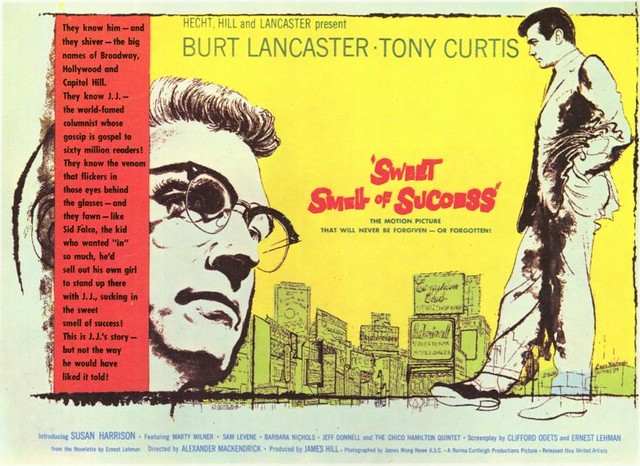
I'd heard a lot about this film for its dialogue, for being a famously left-wing script that didn't pull its punches. I knew it was a noir about newspapermen. I knew it got compared to Network. I hadn't really thought about that, though, in the terms this presents them: anti-heroes that are newspapermen, as basically slick-talking amoral schucksters and underworld power barons. Actually, I've been reading about other stories that do this, like two Fritz Lang films, While The City Sleeps and Beyond A Reasonable Doubt, so it's not like there's not precedent here -- and in fact, those films were 1956 and 1957 respectively; since Sweet Smell is 1957, clearly something was in the air.
But this isn't really a noir at all. For one thing, the story pointedly lacks femme fatales, and the only woman I can remember in the entire film who wasn't a cowed victim or means to an end (which, in this world, is worse than merely being a "cowed victim") was an older woman long since accustomed to her dubious husband's wandering penis. For another, the anti-hero of the noir is almost always someone able to step through the muck of the underworld and come out clean -- a man whose principles and convictions allow any number of questionable deeds because he knows the ends justify those means. Here the ends are the dirtiest part, the protagonist has to have a last-minute "change of heart" because he hasn't had a straight and true noble purpose from the beginning. This is a story of moral awakening, with innocent people (noir stories generally don't even have innocent people) hurt by terrible people, and that's all good. I'm not disappointed that this isn't a noir -- I don't think it should be -- but it seems to have been miscategorized, if you ask me.
So, sharp-as- and fun-as-hell dialogue, check. The city at night, seething with corruption, check. Fascinating anti-heroes and an alluring world of ugliness, check. Noir trappings -- well, no, but that's okay. But what isn't covered in all of that, that I hadn't expected, was the nuanced and exciting kind of antagonist/villain that this film has. Burt Lancaster's J.J. Hunsecker is wonderful. His introduction is beautifully orchestrated, giving him a practically mythical element (coupled by his story of loving-his-sister-just-a-little-too-much). He's intimidating and every bit believable as a powerful man with the power of will and the ivory-tower separation from the common man that makes him both a pitiable king and an amoral monster.
[SPOILERY NOTE: There was a point very late in the film after Susie had attempted to throw herself off a balcony and Sidney had managed to wrestle her back in. J.J. attacks Sidney, seeming to misconstrue the situation, in fact perhaps knowingly choosing his beloved sister's obvious lie over his dirty-handed minion's more feasible story. (Sidebar: Lancaster is intimidatingly huge; it worked so well for the character in general but it was also great to see that physical threat made manifest, especially on such a deserving scoundrel as Sidney but for all the wrong reasons, fittingly.) In his defense, shouting anything he can to stop the attack, Sidney blurts out that J.J. is behind the framing of Susie's lover. There is an eerie moment -- Susie stands with J.J., no longer sure which side to take here. J.J. turns to her and says, "It's a lie, Susie. Just as I know he lied to me about your suicide attempt, you know he's lying to you about my involvement." Susie obviously knows her suicide attempt was genuine, and for just a moment this invitation to exchange willful ignorances hangs there, and part of me really wanted Susie to agree to it, to sink into the quicksand and say, "Yes, of course Brother," and together they would destroy Sidney, put it all behind them, and rewrite their history fully. That end -- Sidney dying (or being run out, or locked up, or whatever) and Susie selling her soul to stay at her brother's side -- would have been so dark I think it would have been unsatisfying, ultimately, but there was a moment there where I wanted to see how it would play out, how dark could this dark story get, and would it dare?]
I don't think of the 50s as an era with layered characters exploring moral gray areas (or at least making your audience sympathize with characters firmly entrenched in the black, say). I guess audiences didn't either, from what I read about the initial audience response to this. Critics loved it, though, for all of its sharp-tongued intelligence and emotional messiness, and, not surprisingly, so did I.
16 May 2011
Blow Out
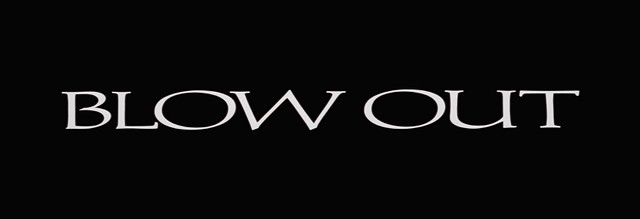
The A.V. Club repeatedly cites Blow Out as the unofficial king of De Palma films, and I may have let this one get a little too built up in my excitement to see it. (It didn't help that they were writing about it in such celebratory terms a full six weeks or so before the film was finally re-released by Criterion, or that it took me almost a full month after that to finally find the time to sit and watch it.) It's definitely engaging, and it's fun, and it's smart, but I'm not sure off-hand where I'd place it between good and best. But there's no denying that it's a very good film -- and man, it's surprisingly tense at parts, in both a good and bad way. On a personal note, I'm starting to feel some stressed-out anxiety about deadlines and projects and time budgeting, and this movie was probably a poor choice for the ninety-minute Relaxation Session I was sort of hoping for.
But enough with the audience's apologies and outside influences. I don't have a lot of time and I should really be at least mentioning the film's influences that struck me if I'm going to blather about anything. You can't really talk about De Palma without talking about what films influence him, can you? No wonder certain kinds of critics are in love with him and others are... less-than-in-love with him. I haven't seen Blow-Up in too long to compare the two, but I did pretty recently watch The Conversation, and it's pretty much impossible NOT to compare those films. (Note: I distinctly remember watching The Conversation about two months ago, but checking previous posts I realize I never wrote anything on it, because I think circumstances got in the way and I never finished it. Alas.) Blow Out is such a visceral ride and The Conversation is so cerebral. Both are uncomfortable in their paranoia. Harry Caul has a much more developed and three-dimensional paranoia than Jack Terry's, but both stem from being too good at their jobs and hiding from a past that involved getting someone killed. And in my memory, both films star Dennis Franz, but a little research proves that The Conversation starred Allen Garfield as Bernie the slick competitor. So let's say both films star Dennis Franz-types.
There's a lot of really striking shots here that I couldn't quite put my finger on the intent behind -- other than being striking. Similarly, there is a lot of really overt symbolism here, like driving your jeep willy-nilly through the parade of firefighters, policemen, and Uncle-Sam dressed paraders, and crashing through a storefront window into a mannequin-reenactment of a revolutionary-war era hanging. Sally screaming for help and being murdered in front of a massive American flag. The number of times telephones appear when someone is being betrayed or killed. The repeated motif of the bell icon, providing a crossover between Liberty, Telecommunications, and the city of Philadelphia. But I don't know what, specifically, to make of any of these, to be honest. I do know I haven't given them enough thought yet, and so maybe with more time or repeated viewings a connection will come to me; but with Brian De Palma, whose scenes sometimes feel like they come with neon signs reading CLEVER SET PIECE, it's also possible that the repeated motifs are there so that a motif can repeat, because that's what films do. It's entirely possible that he's built all the thematic structure he can into a piece without any of the thematic content. I kind of think there's some of that in Body Double at least, and possibly Carrie. I think that's part of why his films work so well for some and so poorly for others. The man tells interesting, excessively self-conscious stories set in excessively self-conscious movie-centric worlds, but he doesn't really say much. It's not like he says nothing, or that his films are meaningless -- far from it -- but he definitely doesn't make films whose primary intent is to say much of anything, or explore an idea very deeply. He makes films to echo smartly, and add layers and voices to pre-existing text.
Maybe Brian De Palma is the starkest, most obvious example of that phenomenon I just babbled about recently, the man who touched-up millennia-old cave art in Aboriginal Australia and said he wasn't painting, that the spirits were painting. Maybe De Palma is repainting those lines, continuing an artistic process that's still in its infancy. Remaking a film could certainly be called an example of this, but maybe a more interesting and almost as obvious example is what De Palma does -- which, for the record, isn't so novel: off the top of my head Tarantino, Scorsese, Haynes, Jarmusch all do variations of the same. "Homages," right?
It's possible there's some interesting thought there. Or it's possible I just rattled off a stream-of-consciousness game of free association through ideas and said almost nothing at all about the film Blow Out itself. Then again, it's possible that in doing so I've done exactly what De Palma would want me to: I've used this film to springboard into a talk about Film. There's an hour-long interview between De Palma and Noah Baumbach on this disc that's supposed to be pretty great. One of these nights I'll watch it, and maybe I'll have a better idea then what De Palma intended with non-specific filmic homages like this.
12 May 2011
Cave of Forgotten Dreams *
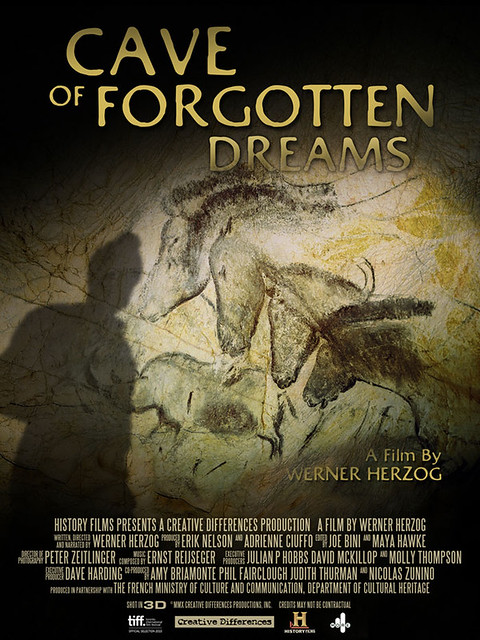
It took me longer than usual to get around to blogging this one, so my reactions aren't as fresh or as sharp as I like, but sometimes that's how it goes. There's a lot to recommend about this film, but most of it you can almost guess before going in. It's a gorgeous and unusual (and totally beautifully appropriate) use of 3D. It's narrated by a madman poet who is singularly able to remain completely unironic and earnest when asking scientists if numbers in a phone directory have souls, or if we are all mutant albino alligators staring at our own doppelgangers through glass. It's profoundly moving and, honestly, a little existentially shaking to be in the presence of 32,000-year-old art and religion. And I think Herzog is completely right to ask bold and awkward questions about the soul: art and religion are inarguably the arenas of the soul, they are our expression of the soul today and their birthplace, whenever that happened exactly, would be the soul's birthplace as well. At least in any meaningful way, as far as this atheist/secular humanist is concerned.
But all of that feels like what almost anyone would say after seeing this film. Some more personal thoughts/reactions I had are to two of the little Herzog tangential thoughts, the notes and anecdotes on the fringe of the cave story. One: I'm surprised, somehow, to find that musical scales haven't changed in 32,000 years -- that the flutes found in other caves use the very same notes and scales we use today. I don't know, I'm not a trained musician but I've taken a class or two, and I know that Eastern musical scales for example are (or were, historically) very different from Western (which I believe is "pentatonic," but rather than look it up I'll just expose my ignorance and half-education here -- I'm just that lazy). I think a lot of people just thought it was a very silly moment when the archaeologist played "The Star-Spangled Banner" on the caveman flute, but the very fact that you can kind of impressed and amazed me.
And two: the story of the aboriginal cave-wall painters touching up thousand-year-old art, and the European anthropologist who asked him why he was painting. The man's answer was that he wasn't painting, that a spirit was painting. It was difficult to determine (or maybe: it is difficult for me to remember) if he literally meant the spirit of the original painter or not, but I took it more as the spirit of the art, or the spirit that inspired the first art, or "the spirit" in a more holistic, non-individualistic sense of spirits -- and that idea I found kind of profoundly moving. In a weird way, that's all (we) artists do with art today, with paintings and narrative and mythology and religion. We see a piece of The Same Old Legends in disarray -- atrophying from lack of attention, from cultural entropy or whatever -- and something moves us to revive it, and paint new lines to fill in the old. Sure, there's more to it, there's that western individualism kicking in, and we feel the vital imperative to season the stew just a little bit, and I'd be lying if I didn't say that adding my voice to the grand story isn't an appealing part of why (we) artists make art. In fact, the ego-centric drive to create art is so strong that I think (we) artists need moments like the aborigine story in Caves to reminded of something grander and far simpler -- that all human art could be viewed as a single tapestry being continually touched up by new hands channeling old spirits.
What struck me strongest in the film was simply the presence of the walls, the caves, the freshness of the art, the profoundness of a window into ancient human history, Herzog's mad-poet voiceover with his matter-of-fact exposition sprinkled with stark humanistic philosophy, and the exciting and justifiable-beyond-merely-dazzle use of 3D, but that all seems like everybody's reaction. Commonalities with our ancestors in music and a connectedness in our storytelling and art that makes me go all Jungian -- those reactions were smaller, more compartmental, but they felt more specific and more fun to rant about.
Seen (in 3D!) at Cinema 21.
10 May 2011
In The Loop

I finally got around to seeing this, and I knew I would like it. I have vague memories of critics comparing it to Dr. Strangelove, probably for its depiction of government and war policy as being dictated by petty tension and paranoia between allies. I can see a reason to compare the two (satire of the government which is both outlandish and frighteningly plausible? Overt sexual tension, frustration, and gay panic channeled inappropriately into policymaking? No line between personality quirk and philosophical stance?), but it actually felt more like The Office meets Traffic, or something, to me. It's funniest when it's meanest, which is a lot like being funniest when it's angriest.
I expected, considering the first six minutes or so and Simon's continual similar fuckups throughout, that this was going to quickly turn into a comedy of errors and misunderstandings like some geopolitical Shakespeare farce, and although I was ready to laugh and enjoy just that I'm relieved it didn't go there. Too many coincidental blunders and conveniently misheard mutterings creates a story so tightly wound and artificial that it's hard to sustain itself, a dramatic Rube Goldberg machine. Instead -- apart from main characters Simon and Toby -- In The Loop hinges primarily on petty, small-minded characters lashing out in bitterness or undermining each other through paranoia and the assumption of corruption, deceit, and self-centeredness. It's almost like an answer to Ayn Rand's philosophies in that most of the people here, even the loathsome ones, aren't terrible or evil, but they assume that everyone else is, and that causes them to act terribly or evilly. But mainly it's just satisfying when the characters are driving the story instead of being driven by clever contrivances for ninety minutes.
I know I rant about this very same thing pretty much all the time, but a story driven by its characters means they are making the decisions, means the story matters to them and to us, and means the characters matter and who they are and how they are constructed matters. Otherwise it's just a series of plotpoints, a connect-the-dots, a clever piece of architecture -- or as I just mentioned, a Rube Goldberg machine. A story where the characters matter and the decisions matter that also manages amusing and clever twists and turns and surprises is always going to be more satisfying.
Tags:
armando iannucci,
i
Subscribe to:
Comments (Atom)

